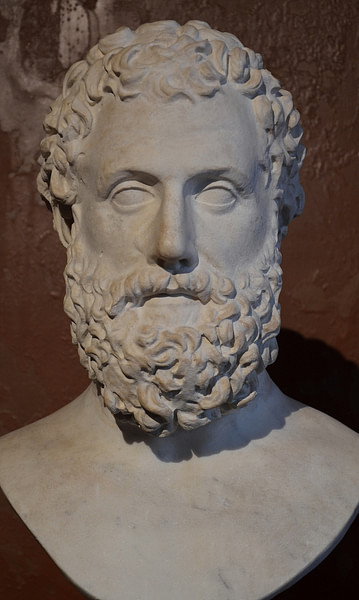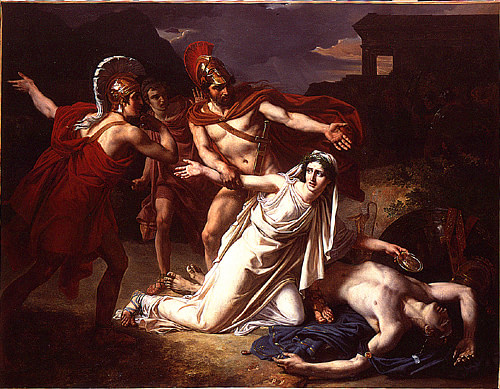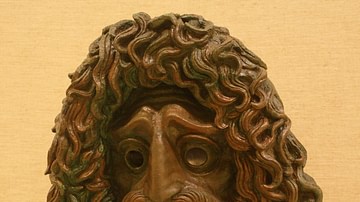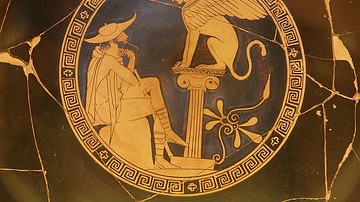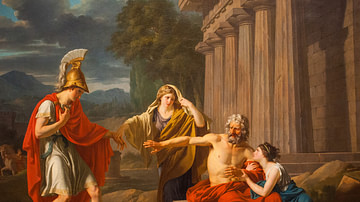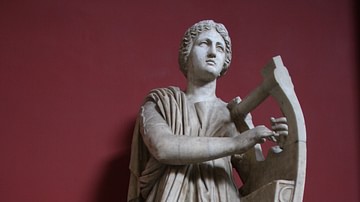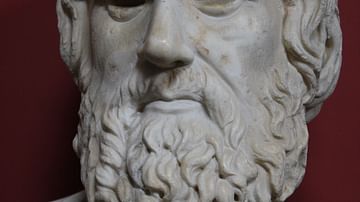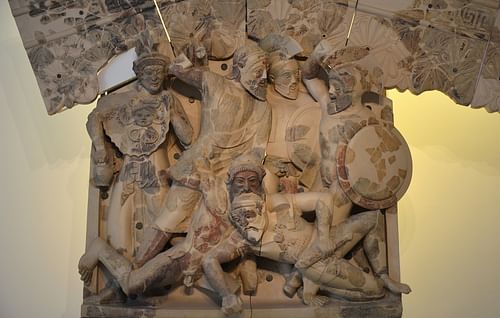
Seven Against Thebes is the third part of a trilogy written by one of the greatest of the Greek tragedians, Aeschylus in 467 BCE, winning first prize in competition at Dionysia. Unfortunately, only fragments of the first two plays, Laius and Oedipus and the accompanying satyr drama Sphinx remain. Based on the well-known ancient Greek myth surrounding King Oedipus of Thebes, Seven Against Thebes centers on this rivalry between Eteocles and Polynices, the two sons of Oedipus, fulfilling the curse of their father, never being able to settle their dispute and, in the end, falling by each other's hand. As evident with his most famous work Oresteia, Aeschylus may well have been the only tragedian to treat his trilogies as a single drama. This practice is evident in Seven Against Thebes where he makes a number of references to events from the first two plays.
Aeschylus
Considered the father of Greek tragedy, Aeschylus was born around 525 BCE into an aristocratic family of Eleusis, an area west of central Athens. A proud Athenian, he fought against the Persians at the Battle of Marathon in 490 BCE where his brother was killed. Some scholars claim he may have also fought at the Battle of Salamis in 480 BCE. He began writing about this same time, winning his first victory in 484 BCE. Of his over 90 plays only six have survived – the authorship of a seventh Prometheus Bound is in question. He was best known for his use of the chorus and introduction of a second speaking actor thereby allowing plot development to be given more freedom. His two sons, Euaion and Euphorion, were both playwrights.
Historian Norman Castor in his book Antiquity said that the purpose of Aeschylus's dramas was not to tell a story but to explore a problem. Classicist Edith Hamilton in her The Greek Way said he was the first poet to grasp the “bewildering strangeness of life” (182). She added that he was profoundly religious but somewhat radical, pushing aside the trappings of traditional Greek religion. The gods in his plays are seen as shadows, “questioning how a god can be considered just when people are allowed to suffer” (193). Late in life, Aeschylus traveled to Sicily where he would continue to write. He died there around 456 BCE.
The Myth
Most people in the audience would have been well-aware of the myth surrounding Oedipus and the curse of King Laius. However, to fully understand and appreciate the play the casual observer had to understand the plight of the doomed family of the king and the legend surrounding the tragedy of Oedipus. Prior to his birth, his father, King Laius, is foretold by an oracle that his son will one day kill him. To avoid this tragedy the baby Oedipus is sent away with orders to be killed. Unfortunately, the soldier sent to perform the deed could not, and by a stroke of luck, the child is raised by the king of Corinth and his wife. Years later, an adult Oedipus returns to his birthplace of Thebes and unknowingly fulfills the prophecy – killing his father and marrying his mother. Eventually, Oedipus, now the king of Thebes, learns of his sinful deed, blinds himself, and goes into exile. Along with his daughter, Antigone, he wanders as an outcast for many years until settling in Athens at the request of King Theseus. Prior to his death, he places a curse on his two sons; they will never be able to settle their differences and will die in battle. Seven Against Thebes centers on this rivalry between Eteocles and Polynices, the two sons of Oedipus. Although mentioned by name, Polynices does not appear or speak in the play.
After the exile of Oedipus, the brothers agree to share the throne of Thebes; each would serve alternate one-year reigns. Eteocles chose to rule first, but at the end of his year refused to relinquish the throne to his brother, forcing Polynices to go into exile. In retaliation for his brother's treachery, Polynices aligns himself with King Adrastus of Argos, and a war ensues. Surrounded by the Argives, Eteocles is forced to do battle, and one by one, he sends his seven bravest champions outside the seven gates of Thebes against the best seven of Argos. With the war at a stalemate, Eteocles, the last hope of Thebes, fights his brother at gate seven where both are killed. The attackers are repelled, and the war ends. As with the Sophocles play, Antigone attempts to bury her brother Polynices (he is considered a traitor), despite the warnings of the Theban leadership. Although not mentioned in the play, according to the legend, the next generation of Argos returns to battle Thebes and is victorious.
Characters
Until the very end when Antigone and Ismene make their appearance, much of the play is spent with Eteocles speaking to the chorus. Therefore, there are relatively few characters:
- Eteocles
- Antigone
- Ismene (non-speaking)
- a messenger
- a herald
- and, of course, the chorus.
The Plot
The play opens with Eteocles confronting a large crowd of concerned Thebans. It is obvious that Polynices and his fellow Argives are gathered outside the walls of Thebes preparing for battle. The citizens have come to their king for reassurance. He speaks to them in a tone of comfort. He pleads with them to keep the altar, help the children, and lastly to help mother Earth. He informs them that a prophet has foretold that the enemy plans an assault, so they must tend to the gates and towers. In an attempt to ease their worries, he has sent spies and scouts to the enemy.
A messenger enters to tell Eteocles of the “fierce” seven commanders approaching the gates and advises him to “barricade your town before the blast of Ares strikes it in storm: we already hear the roar of the armed land wave” (Grene, 72). The nervous king prays to the gods to protect his city. The chorus is troubled, asking who will protect them, who will be their champion. What god or goddess will shelter them? Speaking of the approaching enemy, they exclaim:
Seven proud captains of the host, with harness and spear, have won their place by lot; they stand champions at seven gates. (75)
They shout to Zeus, to Apollo and to Athena. Speaking to the chorus, Eteocles is angry and says there are many in the city who are afraid, accusing them of being spiritless cowards. He insults them by calling them all a tribe of women. The enemy is gaining strength. If the people fail to obey his orders - both men and women - they will be sentenced to death. “Obedience is mother to success and wife of salvation.” (78) He charges the chorus not to allow the citizenry to become cowards, pray that the towers hold them off, be quiet and not overly fearful. The chorus leader is concerned and frightened:
Our city groans from its foundation, we're surrounded. ... I'm afraid: the din at the gates grows louder. (79-80)
Eteocles tries to console him, telling him that it is not for him to worry and, again, asks him not to speak of what he hears to the city. The chorus leader remains fearful, adding that he will not be a slave. To the chorus Eteocles speaks of his plans:
I will take six men, myself to make the seventh, and go to post them at the city's gates, opponents of the enemy, in gallant style. (81)
He exits. The chorus speaks aloud of the chaos behind the city walls; screams, roving bands of pillagers. Eteocles returns just as a messenger arrives with news of the enemy; each Argive champion stands at his appointed gate. He asks the king who shall be sent to the first gate, who deserves their trust. Eteocles listens as the messenger speaks of the might of first enemy champion but quickly dismisses the threat, no equipment of man will make him tremble. He chooses his first champion to face the enemy.
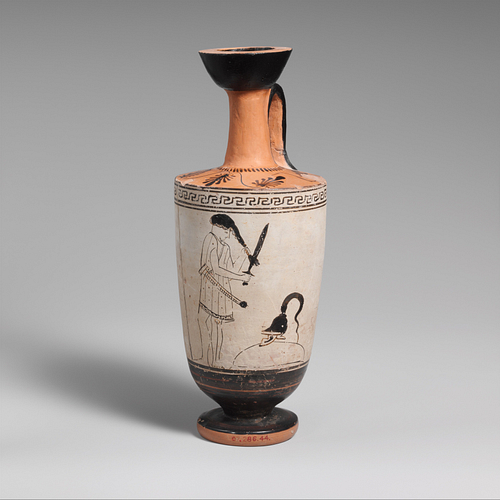
One by one, Eteocles selects the champions to face the enemy. They all watch as the men do battle at the third, fourth, fifth, and sixth gates. Finally, the messenger speaks to Eteocles. At the seventh gate is his brother, Polynices.
Hear how he curses the city and what fate he invokes on her. He prays that once his foot is set upon our walls, once he is proclaimed the conqueror of this land, once he has cried a paean of triumph in its overthrow, he then may choose to fight with you and killing encounter his own death beside your corpse. (93)
Eteocles cries out that his father's curse has been fulfilled. He asks for his greaves to shield him. Although the chorus leader begs him not to go, Eteocles insists that he must. Eteocles exits. The messenger soon returns. At the seventh gate, the brothers have died by each other's hand; the curse has come true.
With brothers' hands they achieved their mutual murder. The city is saved, but of the royal pair the ground has drunk the blood shed each by each. (101)
Attendants bring in the bodies of the two slain brothers. A herald remarks:
It is duty to declare to you counselors of the people, the resolves already taken … Our lord Eteocles for his loyalty it is determined to bury in the earth he so loved. (108)
However, the traitor Polynices must be cast out unburied. As with Sophocles' play Antigone declares:
… yet will I bury him and take the danger on my head alone when that is done. He is my brother. I am not ashamed of this anarchic act of disobedience to the city. (109)
The herald stands fast, forbidding her, but she remains resolute. Antigone, with half the chorus, stands with the body of Polynices while Ismene, with the second half, stands with the body of Eteocles. They all leave to bury the bodies.
Legacy
Aeschylus's influence would live long after him, even having a profound effect on his fellow tragedians. References to Seven Against Thebes appear in both Aristophanes' Frogs and Euripides' Phoenician Women. The play would survive well into the Byzantine and Renaissance eras. Unfortunately, its present-day form may not be the same one penned by Aeschylus. Many scholars believe that parts of the play were rewritten years later to keep it in line with Sophocles' Antigone, a play presented 15 years after Aeschylus's death. This is quite evident is the climax; Antigone only appears in the final lines of the play to voice her concern about Polynices' unburied body. Despite this rather abrupt conclusion, the play has stood the test of time and influenced not only his fellow tragedians but others well into the Renaissance.
